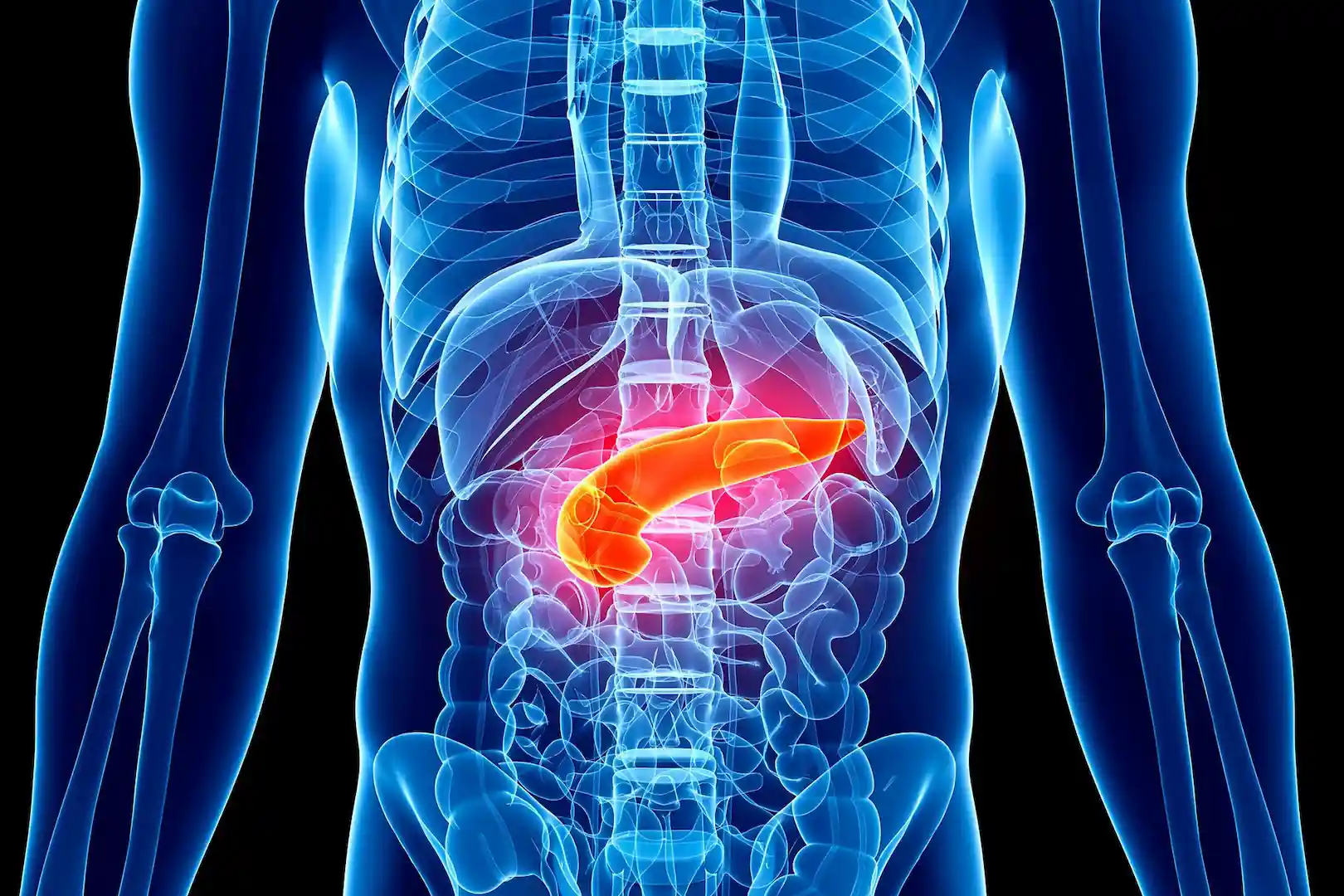Surgical Time
3-6 hours
Anesthesia
General
Recovery
3-6 months
Hospital Stay
7-14 days
Total Stay
3-4 weeks
Back to Work
4-8 months
Pancreas Transplant in Iran:
Treating Diabetes and Related Conditions
Pancreas transplantation in Iran offers a treatment option for individuals with type 1 diabetes, particularly those who also have severe kidney disease. This complex surgical procedure aims to restore insulin production and improve the management of diabetes-related complications. This comprehensive article delves into pancreas transplantation in Iran, covering the conditions treated, the evaluation process, the surgical procedure, and the post-transplant care involved. We will explore how pancreas transplantation can impact the lives of patients with challenging diabetes management.

Understanding Pancreas Transplantation
Pancreas transplantation is a surgical procedure in which a healthy pancreas from a deceased donor is transplanted into a person with diabetes. The pancreas is an organ that produces insulin, a hormone that regulates blood sugar levels. In type 1 diabetes, the pancreas produces little or no insulin, leading to the need for lifelong insulin therapy. Pancreas transplantation aims to restore the body’s ability to produce insulin naturally, potentially eliminating or reducing the need for insulin injections.
Conditions Treated with Pancreas Transplantation
Pancreas transplantation in Iran is primarily considered for individuals with:
Type 1 Diabetes
This is the main indication for pancreas transplantation:
- – Type 1 Diabetes: Particularly patients who experience:
- — Severe hypoglycemia (low blood sugar) episodes
- — Unstable blood sugar levels that are difficult to control
- — Developing or existing kidney disease (diabetic nephropathy)
Kidney Disease
Pancreas transplantation is often performed in conjunction with kidney transplantation:
- – End-Stage Renal Disease (ESRD): Patients with type 1 diabetes who have developed kidney failure may be candidates for a combined kidney-pancreas transplant.
Pre-Transplant Evaluation and Patient Selection in Iran
A thorough evaluation is essential to determine if a patient is a suitable candidate for pancreas transplantation in Iran. This involves a comprehensive assessment of the patient’s condition:
Medical Assessments
These assessments evaluate the severity of diabetes and related complications, as well as the patient’s overall health:
- – Medical History and Physical Examination: A detailed review of the patient’s medical history, diabetes management, and current health status.
- – Diabetes Evaluation: Assessing blood sugar control, frequency of hypoglycemic episodes, and insulin requirements.
- – Kidney Function Tests: Evaluating kidney function, especially if a combined transplant is being considered.
- – Cardiovascular Evaluation: Assessing heart and blood vessel health.
Additional Evaluations
These assessments evaluate the patient’s suitability for surgery and post-transplant care:
- – Infection Screening: Tests to rule out infections.
- – Immunological Testing: Blood typing and tissue matching to determine compatibility with a donor pancreas.
- – Psychological Evaluation: Assessment of the patient’s emotional and mental readiness for the transplant.
- – Social Evaluation: Evaluation of the patient’s support system and ability to adhere to the post-transplant regimen.
The transplant team carefully reviews all the information to determine if pancreas transplantation is the best treatment option.
Types of Pancreas Transplantation in Iran
Pancreas transplantation in Iran can be performed in different ways:
Pancreas Transplant Alone (PTA)
This involves transplanting the pancreas in a patient who does not yet have kidney failure.
Simultaneous Kidney-Pancreas Transplant (SKP)
This involves transplanting both the pancreas and the kidney at the same time in a patient with both diabetes and kidney failure. This is the most common type of pancreas transplant.
Pancreas After Kidney Transplant (PAKT)
This involves transplanting the pancreas in a patient who has already received a kidney transplant.
Islet Cell Transplantation
While not a full organ transplant, islet cell transplantation involves transplanting only the insulin-producing cells (islet cells) from a donor pancreas into the recipient’s liver. This procedure may be available in some specialized centers but is less common than whole pancreas transplantation.
The Pancreas Transplant Surgery Procedure in Iran
Pancreas transplant surgery is a complex procedure. The surgical steps generally include:
Surgical Steps
The procedure typically involves:
- – Anesthesia: The patient is placed under general anesthesia.
- – Incision: An incision is made in the abdomen.
- – Placement of the Donor Pancreas: The donor pancreas is placed in the abdomen.
- – Connection of Blood Vessels and Ducts: The blood vessels of the donor pancreas are connected to the recipient’s blood vessels, and the pancreas’s duct is connected to the bladder or small intestine.
- – Closure: The abdomen is closed.
If a simultaneous kidney-pancreas transplant is performed, the kidney transplant procedure is done at the same time.
Post-Transplant Care and Recovery in Iran
Post-transplant care is crucial for the success of pancreas transplantation. It involves:
Immediate Post-Surgery Care
This includes:
- – Intensive Care Unit (ICU) Stay: Close monitoring in the ICU.
- – Immunosuppressant Medications: Medications to prevent organ rejection.
- – Monitoring Pancreas Function: Closely observing the new pancreas for signs of function (insulin production).
- – Monitoring for Complications: Watching for complications such as infection, bleeding, and pancreatitis.
Long-Term Recovery and Follow-up
This phase involves:
- – Immunosuppression Management: Lifelong management of immunosuppressant medications.
- – Diabetes Management: Monitoring blood sugar levels and adjusting medications as needed. Ideally, insulin independence is achieved.
- – Monitoring Kidney Function: If a combined transplant was performed, ongoing monitoring of kidney function is crucial.
- – Monitoring for Rejection: Regular tests to detect and treat organ rejection.
- – Managing Complications: Addressing potential complications.
Outcomes and Survival Rates of Pancreas Transplantation
Pancreas transplantation outcomes have improved, offering many patients with type 1 diabetes a better quality of life. Success rates vary depending on the patient’s condition and other factors. Long-term survival requires ongoing medical care and adherence to the post-transplant regimen.
Pancreas Transplantation in Iran: What to Expect
Specialized transplant centers in Iran offer pancreas transplantation, often in conjunction with kidney transplantation. These centers have multidisciplinary teams with expertise in this complex procedure. Access to pancreas transplantation in Iran provides a valuable option for eligible patients.
Cost Considerations for Pancreas Transplant in Iran
Pancreas transplantation is a costly procedure due to its complexity and the need for specialized care. Costs can vary depending on the hospital and the length of the hospital stay. Compared to some Western countries, the cost of pancreas transplantation in Iran may be relatively lower.
Choosing a Pancreas Transplant Center in Iran
Selecting an experienced and specialized transplant center is crucial for successful pancreas transplantation. Key factors to consider include:
Key Factors to Consider
- – Experienced Multidisciplinary Team: Endocrinologists, transplant surgeons, nephrologists, nurses, and other specialists with expertise in pancreas transplantation and diabetes management.
- – Advanced Facilities: A hospital with a dedicated transplant unit and intensive care facilities.
- – Comprehensive Care: A program that provides thorough pre- and post-transplant care, including diabetes management and rejection monitoring.
- – Outcomes and Experience: The center’s track record of successful pancreas transplants.
Conclusion
Pancreas transplantation in Iran offers a complex but potentially life-changing treatment for individuals with type 1 diabetes, particularly those with kidney disease. Specialized centers with experienced medical teams provide this option, offering hope for improved diabetes control and a better quality of life. Understanding the procedure, the challenges involved, and the commitment to long-term care is essential for patients and their families considering pancreas transplantation.
